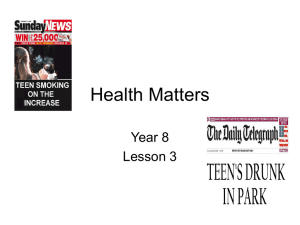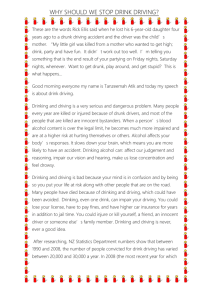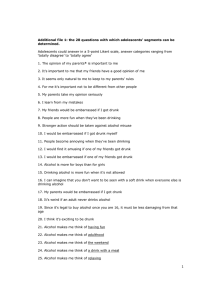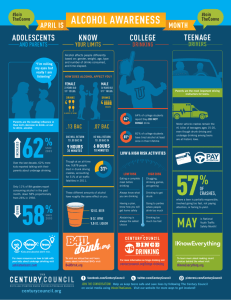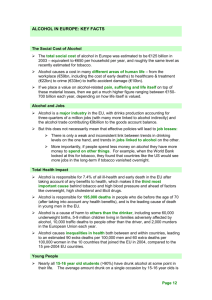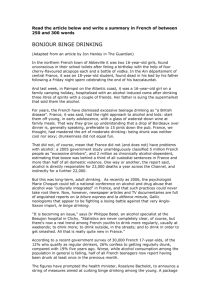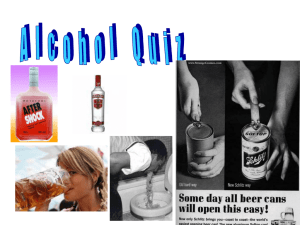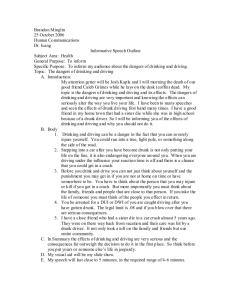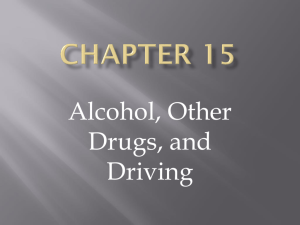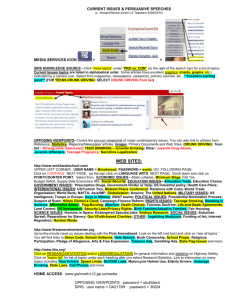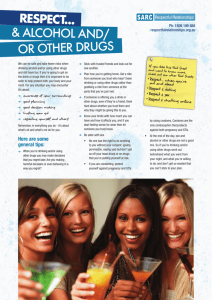Safety Meeting Outline
advertisement
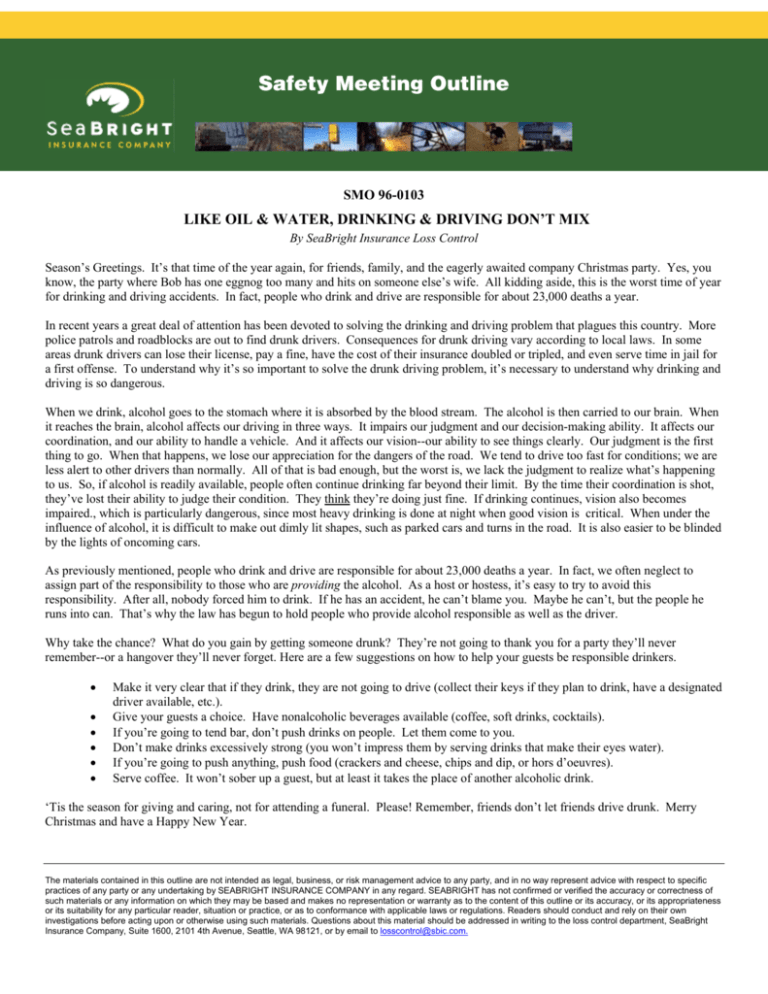
Safety Meeting Outline SMO 96-0103 LIKE OIL & WATER, DRINKING & DRIVING DON’T MIX By SeaBright Insurance Loss Control Season’s Greetings. It’s that time of the year again, for friends, family, and the eagerly awaited company Christmas party. Yes, you know, the party where Bob has one eggnog too many and hits on someone else’s wife. All kidding aside, this is the worst time of year for drinking and driving accidents. In fact, people who drink and drive are responsible for about 23,000 deaths a year. In recent years a great deal of attention has been devoted to solving the drinking and driving problem that plagues this country. More police patrols and roadblocks are out to find drunk drivers. Consequences for drunk driving vary according to local laws. In some areas drunk drivers can lose their license, pay a fine, have the cost of their insurance doubled or tripled, and even serve time in jail for a first offense. To understand why it’s so important to solve the drunk driving problem, it’s necessary to understand why drinking and driving is so dangerous. When we drink, alcohol goes to the stomach where it is absorbed by the blood stream. The alcohol is then carried to our brain. When it reaches the brain, alcohol affects our driving in three ways. It impairs our judgment and our decision-making ability. It affects our coordination, and our ability to handle a vehicle. And it affects our vision--our ability to see things clearly. Our judgment is the first thing to go. When that happens, we lose our appreciation for the dangers of the road. We tend to drive too fast for conditions; we are less alert to other drivers than normally. All of that is bad enough, but the worst is, we lack the judgment to realize what’s happening to us. So, if alcohol is readily available, people often continue drinking far beyond their limit. By the time their coordination is shot, they’ve lost their ability to judge their condition. They think they’re doing just fine. If drinking continues, vision also becomes impaired., which is particularly dangerous, since most heavy drinking is done at night when good vision is critical. When under the influence of alcohol, it is difficult to make out dimly lit shapes, such as parked cars and turns in the road. It is also easier to be blinded by the lights of oncoming cars. As previously mentioned, people who drink and drive are responsible for about 23,000 deaths a year. In fact, we often neglect to assign part of the responsibility to those who are providing the alcohol. As a host or hostess, it’s easy to try to avoid this responsibility. After all, nobody forced him to drink. If he has an accident, he can’t blame you. Maybe he can’t, but the people he runs into can. That’s why the law has begun to hold people who provide alcohol responsible as well as the driver. Why take the chance? What do you gain by getting someone drunk? They’re not going to thank you for a party they’ll never remember--or a hangover they’ll never forget. Here are a few suggestions on how to help your guests be responsible drinkers. • • • • • • Make it very clear that if they drink, they are not going to drive (collect their keys if they plan to drink, have a designated driver available, etc.). Give your guests a choice. Have nonalcoholic beverages available (coffee, soft drinks, cocktails). If you’re going to tend bar, don’t push drinks on people. Let them come to you. Don’t make drinks excessively strong (you won’t impress them by serving drinks that make their eyes water). If you’re going to push anything, push food (crackers and cheese, chips and dip, or hors d’oeuvres). Serve coffee. It won’t sober up a guest, but at least it takes the place of another alcoholic drink. ‘Tis the season for giving and caring, not for attending a funeral. Please! Remember, friends don’t let friends drive drunk. Merry Christmas and have a Happy New Year. The materials contained in this outline are not intended as legal, business, or risk management advice to any party, and in no way represent advice with respect to specific practices of any party or any undertaking by SEABRIGHT INSURANCE COMPANY in any regard. SEABRIGHT has not confirmed or verified the accuracy or correctness of such materials or any information on which they may be based and makes no representation or warranty as to the content of this outline or its accuracy, or its appropriateness or its suitability for any particular reader, situation or practice, or as to conformance with applicable laws or regulations. Readers should conduct and rely on their own investigations before acting upon or otherwise using such materials. Questions about this material should be addressed in writing to the loss control department, SeaBright Insurance Company, Suite 1600, 2101 4th Avenue, Seattle, WA 98121, or by email to losscontrol@sbic.com. SAFETY MEETING AGENDA DEPARTMENT/JOB SITE: _____________________________ MEETING DATE: _______________________ 1. Open Meeting & Present safety topic: _______________________________________________________ 2. Read minutes from previous meeting. 3. Persons present: ______________________________________ _________________________________________ ______________________________________ _________________________________________ ______________________________________ _________________________________________ ______________________________________ _________________________________________ ______________________________________ _________________________________________ 4. Old Business – Status of previous recommendations. Discuss pending old business if any. 5. Accidents – Discuss accidents and near misses that have occurred since the last meeting. Brief summary of accidents to date by number and type. Note any trends. Discuss corrective action taken, or needed. Concentrate on accident causes to make everyone more aware. 6. Inspection Reports – Report on findings and recommendations of any inspection reports made since last meeting. 7. New Business – Solicit employee suggestions. Discuss new procedures, changes to company safety policy, etc. TIME MEETING STARTED: _____________________________ TIME FINISHED: _______________________ MEETING CHAIRED BY: _______________________________ TITLE:________________________________
